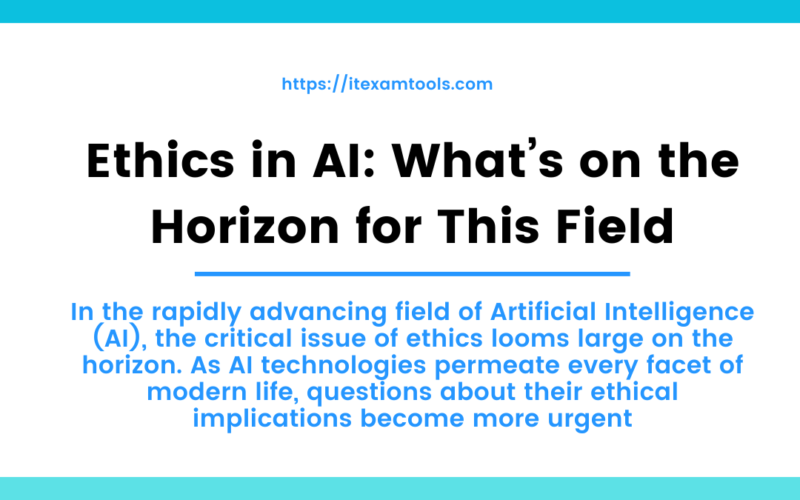Smart Phone Remote Controller ● Widespread Compatibility: Your smartphone can function effectively with the standard connector that is frequently used to replace iOS cellphones.● Plug and Play: Your smartphone may become an…
Ethics in AI: What’s on the Horizon for This Field

Ethics in AI: Navigating Complexities and Shaping a Responsible Technological Horizon
In the rapidly advancing field of Artificial Intelligence (AI), the critical issue of ethics looms large on the horizon. As AI technologies permeate every facet of modern life, questions about their ethical implications become more urgent.
Striking a balance between innovation and responsible use is paramount. From the potential for biased algorithms to the ethical challenges of autonomous decision-making, the AI community is grappling with complex dilemmas.

Efforts to ensure transparency, accountability, and fairness in AI systems are shaping the future of this field. As we forge ahead, ethical considerations will be integral in defining how AI transforms our world.
The horizon of AI ethics presents both challenges and opportunities. Building ethical AI requires interdisciplinary collaboration, involving not only technologists but also ethicists, policymakers, and society as a whole.
Establishing guidelines for AI development, addressing biases in data, and fostering accountability are crucial steps.
Ensuring AI respects human values and rights is essential to its responsible integration. In navigating this uncharted territory, a proactive approach to ethics will be instrumental in harnessing AI’s potential for the greater good while safeguarding against unintended consequences.
Imagine the paperclip maximizer — an artificially intelligent machine designed to manufacture paperclips without also being programmed with ethics.
Eventually, the paperclip maximizer — if left alone to fulfill its one goal of manufacturing paperclips — could exhaust all Earth resources and organisms, including humans.
The paperclip maximizer thought experiment demonstrates the importance of ethics in the development and use of artificial intelligence (AI).
If people create AI machines without carefully considering and addressing how the machines can negatively impact humanity and Earth, everyone has a problem.
The good news is that people do think through such dilemmas and recognize the importance of ethics in AI.

Pressing Questions on the Ethics of AI
In 2014, philosopher Nick Bostrom, the originator of the paperclip maximizer thought experiment, published a book: “Superintelligence: Paths, Dangers, and Strategies.” Bostrom argues that once artificially intelligent machines with cognitive abilities comparable to humans exist, it’s only a matter of time before the machines evolve to become superintelligent (exceeding human intelligence).
Some people fear a world filled with superintelligent AI because they see the potential for AI to prioritize self-preservation at the cost of humanity and Earth.
People examine the ethics of AI development and use from diverse angles:
- What is acceptable to do and not to do with AI?
- How does AI technology impact humanity and the non-human world (e.g. ecosystems, plants, animals)?
- Should people create AI to do dangerous or violent tasks that many humans are averse to?
- What powers or abilities should AI wield?
- Should people create superintelligent AI?
- Should people treat humanized robots more like humans or robots?
- Can AI become sentient like biological organisms?
There are no clear-cut answers to these questions.
Artificial Intelligence Enables People
Artificial intelligence describes computing and machines that are designed to act like humans and complete human tasks. Artificially intelligent machines are already at work every day. Examples include game-playing computers, naturally speaking personal assistants, artificial language translators, and computers that help healthcare practitioners diagnose and treat medical conditions.
Epidemiologists use AI to track the global spread of coronavirus and use AI-enriched data to manage COVID-19. Healthcare practitioners use AI robotic arms to conduct complex medical operations with high precision.
AI robots provide companionship and caretaking services to those in need of them. Artificially intelligent technologies also work in factories assembling essential products like automobiles for you to drive.
The creation and use of AI technology come with a burden of responsibility. Since people first began using tools and making larger, more complex objects out of simpler ones, there have been cases where people asked themselves if what they do with technology is right. As people extend these questions about right and wrong to the development of artificial intelligence, they address the ethics of AI.
Current Measures in Major Regions to Address Ethics in AI
Governing bodies, academic institutions, research groups, think tanks, and businesses already dedicate individuals to research, discuss, and plan for the ethical development and use of AI.

AI Ethics Developments in the U.S.
Under President Obama, the U.S. National Science and Technology Council’s (NSTC) Subcommittee on Machine Learning and Artificial Intelligence published a report discussing AI’s roles in society: Preparing for the Future of Artificial Intelligence.
In the report, the Council discusses fairness, justice, accountability, and safety in the development and use of AI. The Council makes 23 recommendations about AI that include suggestions for training and educating Americans about AI ethics. The Council suggests students and employees should understand and incorporate ethical decisions into projects involving AI.
The NSTC’s report also addresses the need for crucial AI product development processes such as product verification and validation. The Council highlights risk management as an important concern: Emergent AI may behave differently in closed development spaces (e.g. laboratories, assembly lines) and open workplaces (e.g. building construction sites, field testing sites).
AI Ethics Developments in Europe
The European Commission has a High-level Expert Group on Artificial Intelligence. This group created Ethics Guidelines for Trustworthy Artificial Intelligence. The Guidelines delineate seven requirements for AI systems to be trustworthy:
- Human agency and oversight: AI technologies should enable and empower people. AI should have mechanisms for human oversight.
- Technical robustness and safety: AI systems should be safe, resilient, secure, accurate, reliable, and reproducible to minimize chances for unintentional harm.
- Privacy and data governance: AI should not compromise people’s privacy, data, or rights to access data of various types.
- Transparency: Data, systems, and models used to create AI, as well as AI itself, should be transparent.
- Diversity, non-discrimination, and fairness: AI systems should not contain or express bias. AI should promote and support diversity and accessibility.
- Societal and environmental well-being: AI systems should benefit humanity and sustainably coexist with humans and Earth organisms now and in the future.
- Accountability: AI systems and their developers should be auditable, accountable, responsible, and subject to redress.
The information contained in the list above is derived from the Guidelines.

Conversations About Ethics in AI Will Continue
The ethics of AI are relevant to your life. People naturally create technologies and uses for them that cause them to question whether the technologies they create and their interactions with them are right, wrong, or — as is often the case — somewhere in between.
Applications of AI that warrant ongoing conversations about AI ethics include:
- Facial recognition systems, employment/hiring systems, and surveillance systems: Do these systems invade personal privacy, exploit personal data, and/or promote various forms of discrimination?
- Voice recognition systems and artificial personal assistants: Do these AI systems monitor people without them knowing?
As people create and use progressive artificially intelligent technologies, concerns about ethics in AI will persist.
Learn More About AI With Udacity
Online learning platforms like Udacity offer opportunities to learn about AI in industry-relevant ways. Udacity offers practical educational programs in AI for learners across skill levels like:
Check out the course catalog and consider registering for one of Udacity’s many interesting Nanodegree programs in artificial intelligence today!
LEARN MORE








